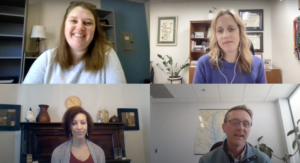CRC’s 50-Year-Long Role in Developing Environmental Leaders

Melissa Fagan, the Environmental Management Career Development Program Coordinator of CRC, moderated the webinar with three alumni speakers who provided insight on their experiences as previous staffers. Kevin Schabow, Office of Habitat Conservation, NOAA Chesapeake Bay Office; Julie Hester, Civic Engagement, The Keith Campbell Foundation for the Environment; and Kara Skipper, Maryland Department of Natural Resources, discussed the skills that the Career Development Program helped them obtain and how those abilities have aided them in their current endeavors.
Takeaways from the webinar
Kevin Schabow (Deputy Director, Office of Habitat Conservation, NOAA Chesapeake Bay Office) was a CRC staffer working with the Communication and Education Subcommittee in 2006-2007. Originally from the north, Kevin graduated from the University of Wisconsin and worked in outdoor education in California. After a few years, Kevin decided to pursue a graduate degree in Environmental Science and Policy at John Hopkins which brought him to CRC.
- Kevin’s experience included planning and executing a biennial education summit, reporting daily bay news, editing press releases, and writing talking points for the Bay Program Director.
- Since Kevin was a graduate student during his term with CRC, he expressed his gratitude for the flexible work hours. In addition, the first-hand experience and networking opportunities contributed to his educational endeavors and expanded his knowledge.
- Kevin met individuals of the same interest and values and developed long lasting friendships.
- After working with the NOAA Chesapeake Bay Office during his internship, they personally asked Kevin to apply for a job due to their previous work encounters. Currently, his position with the office consists of monitoring research, environmental education, place-based initiatives, managing the operation budget, and admin tasks.
- Kevin’s advice to current or future staffers is to ask more questions. Never assume that everyone around you already knows the answer. Be brave.
Julie Hester (Program Director, Civic Engagement, The Keith Campbell Foundation for the Environment) worked on the Nutrient Subcommittee as a CRC staffer from 1998 to 2002. Immediately after graduating from SUNY College of Environmental Science and Forestry at Syracuse University, she joined the CRC team with the intent on escaping the cold northern weather and pursuing her passions.
- The two main topics of Julie’s internship work were nutrient trading principles and stormwater directives. As a result of this experience, she received a field work position with the Department of Health Watershed Protection Division as a liaison for the Bay Program. Afterwards, she worked as a Coordinator of the Citizens Advisory Committee and Local Government Advisory Committee at Alliance for the Chesapeake Bay.
- For the past 17 years, Julie has worked at the The Keith Campbell Foundation for the Environment managing 75 grants a year amounting to approximately $4 million.
- The exposure to various partnerships and perspectives throughout the Bay highlighted the passion and knowledge of the community.
- Julie is excited to announce that the Campbell Foundation is in the process of hiring a new fellow. She is hoping to pay the opportunity forward to the new generation of environmental advocates.
- Julie’s advice to current or future staffers is to be more confident and push yourself to take more opportunities and form more relationships despite being uncomfortable.
Kara Skipper (Implementation Project Officer, Maryland Department of Natural Resources) was a Sustainable Fisheries staffer from 2015-2018. Once Kara graduated from St. Mary’s College of Maryland with a degree in ecology, she participated in an oyster internship with Morgan State University. After 5 years of stormwater sampling, she joined the CRC team and participated in field work, environmental research, and legislation development.
- As a fisheries intern, Kara collaborated with fisheries scientists, managers, and stakeholders to promote ecosystem-based fisheries management for a sustainable Chesapeake Bay. These collaborations offered numerous opportunities for professional development and educational advancement.
- Some of Kara’s outstanding experiences at CRC included a mentorship with NOAA, coordinating and teaching elementary environmental education programs, and volunteering weekly at SERC’s (Smithsonian Environmental Research Center) Estuarine Ecology Lab.
- Other opportunities consisted of attending conferences, webinars, training, certificate programs like presenting at the Restore America’s Estuaries Conference and participating in a grant writing course.These events increased knowledge and understanding about all the different factors that impact the bay and multi organizational collaboration.
- Through her developed relationships in the environmental world, Kara got a job with the Maryland Department of Natural Resources directly following her internship with CRC.
- Kara’s advice to current or future staffers is to have more conversations with the people around you because everyone has such interesting and different experiences.
Resources for further action
Career Development Alumni Network
